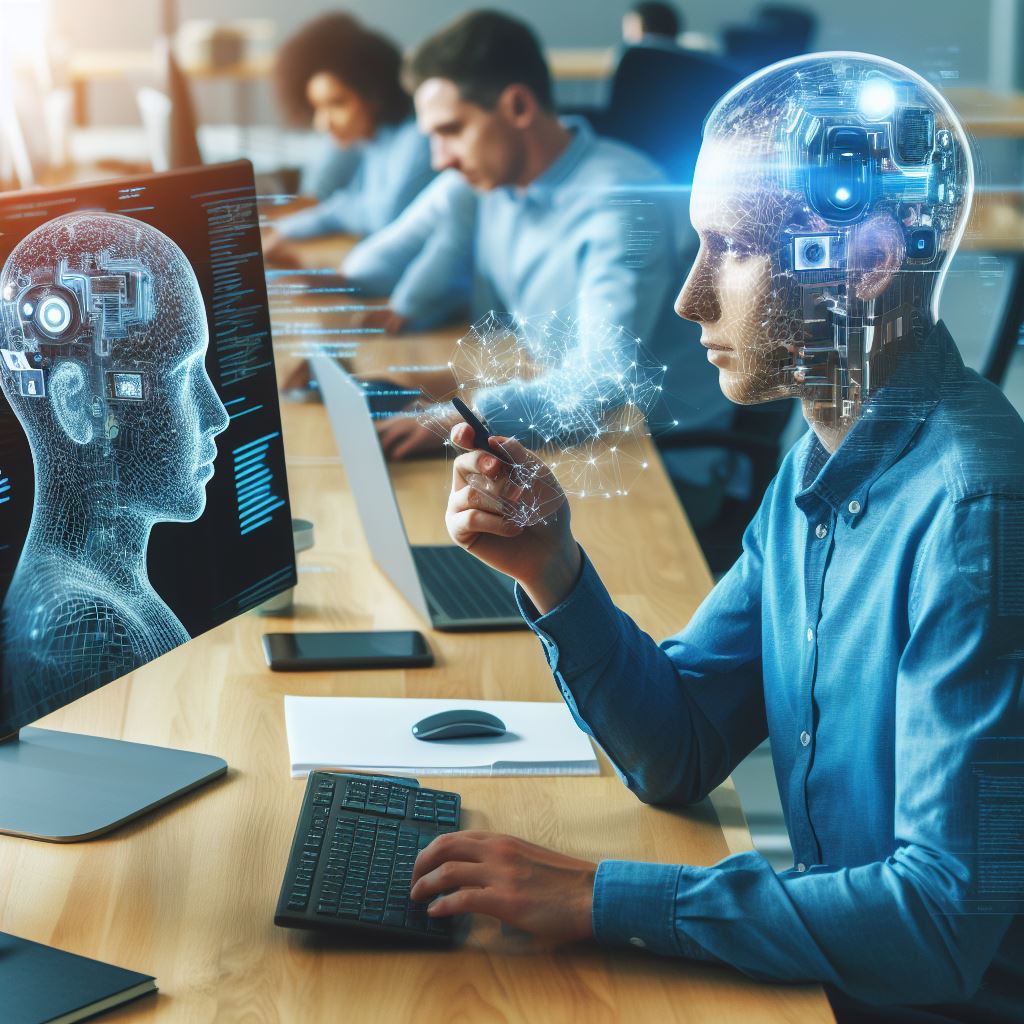Introduction
This blog post explores Role of AI and Machine Learning in Coding Editors.
In today’s rapidly evolving digital landscape, artificial intelligence (AI) and machine learning (ML) have become integral technologies in various fields.
AI refers to the development of machines that can perform tasks requiring human intelligence. ML, a subset of AI, involves the ability of machines to learn from data and improve their performance.
Coding editors are software tools used by developers to write and modify code. These tools provide an interface for programmers to write code efficiently, identify errors, and manage their projects.
They have evolved over the years to include features that enhance productivity and ease the coding process.
Exploring the role of AI and ML in coding editors is essential due to the immense benefits they offer.
AI and ML can analyze code patterns, suggest improvements, and automate repetitive tasks, thereby increasing developers’ efficiency and productivity.
Moreover, these technologies can help identify potential bugs or security vulnerabilities, leading to improved code quality.
By harnessing the power of AI and ML, coding editors can become more intelligent and adaptive, empowering developers to write code more effectively.
Developers can benefit from automated code completion, intelligent error detection, and personalized code suggestions tailored to their coding style and preferences.
In this blog post, we will delve deeper into the potential impact of AI and ML in coding editors, exploring current trends, benefits, and challenges in implementing these technologies.
Join us in exploring the exciting future of coding editors powered by AI and ML!
The Evolution of Coding Editors
Traditional text-based coding editors
- Started as simple, command-line tools for writing and editing code.
- Lacked intelligent features, making coding a more manual and time-consuming process.
- Required developers to have a deep understanding of programming languages.
- Had limited functionality, causing developers to switch between different tools for different tasks.
Introduction of AI and machine learning in coding editors
- AI and machine learning brought a revolution in coding editors.
- Intelligent features such as auto-complete, syntax highlighting, and error detection were introduced.
- Code suggestions and predictive analytics enhanced developers’ productivity.
- Machine learning algorithms learned from developer’s patterns and improved code quality.
Advancements and improvements in coding editors due to AI and machine learning
- Code analysis tools leverage AI to detect code smells and suggest improvements.
- AI-powered refactoring assists in optimizing code for performance and maintainability.
- Language translation capabilities enable developers to work with multiple programming languages.
- Code search and navigation tools powered by machine learning simplify code exploration.
- AI assists in automatically documenting code changes, reducing the burden on developers.
- Collaborative coding platforms employ AI to facilitate real-time code collaboration among developers.
- Code generation from natural language queries helps bridge the gap between domain experts and developers.
- AI-based bug detection and debugging tools enhance code quality and reduce development time.
- Machine learning algorithms analyze data to provide insights and suggestions for code optimization.
- AI-powered coding assistants automate repetitive coding tasks, freeing up developers’ time.
The role of AI and machine learning in modern coding editors has revolutionized the way developers write code.
Traditional text-based editors have evolved into intelligent tools that assist developers in various aspects of coding.
With advancements in AI and machine learning, coding editors have become more intuitive, efficient, and powerful.
Tech Consulting Tailored to Your Coding Journey
Get expert guidance in coding with a personalized consultation. Receive unique, actionable insights delivered in 1-3 business days.
Get StartedDevelopers can now benefit from features such as auto-complete, code suggestions, error detection, and code analysis tools.
Collaborative coding platforms, language translation capabilities, and code search tools powered by AI have further improved the coding experience.
With the help of machine learning algorithms, coding editors can learn from patterns and provide valuable insights for code optimization.
The automation of repetitive tasks and AI-powered debugging tools have increased productivity and reduced development time.
In essence, AI and machine learning have significantly transformed coding editors, making them indispensable tools for modern developers.
Read: Cross-Platform Coding Editors: Write Once, Code Anywhere
Benefits of AI and Machine Learning in Modern Coding Editors
A modern coding editor equipped with AI and machine learning capabilities brings a plethora of benefits for developers.
These intelligent features enhance the coding experience and boost productivity. Let’s explore some of the key advantages:
Improved code completion and suggestions
- AI-powered coding editors offer more accurate code completion suggestions, saving valuable development time.
- Machine learning algorithms understand context and predict the next lines of code based on patterns.
- Code snippets and auto-generated templates help developers quickly implement commonly used code structures.
Enhanced code analysis and debugging
- Machine learning enables coding editors to analyze code for potential errors and vulnerabilities.
- Advanced static code analysis techniques identify bugs, security flaws, and performance issues.
- Intelligent debugging tools can trace and pinpoint errors, making it easier to fix issues.
Intelligent error detection and correction
- AI-powered coding editors can detect common syntax errors and offer suggestions to fix them.
- Machine learning models can learn from frequent code mistakes and provide better error handling.
- Automated code refactoring tools assist in rewriting code snippets to improve readability and maintainability.
Efficient code refactoring and optimization
- AI algorithms help identify code sections that can be optimized for better performance.
- Machine learning models analyze code patterns and suggest refactoring options to eliminate redundancy.
- Coding editors can provide recommendations for using more efficient algorithms or libraries.
Customizable coding styles and preferences
- AI-powered coding editors allow developers to customize coding styles based on personal preferences.
- Machine learning algorithms can learn from individual coding habits and adapt suggestions accordingly.
- Developers can define their preferred indentation, naming conventions, and formatting rules.
In fact, the integration of AI and machine learning in modern coding editors revolutionizes the way developers write and debug code.
These intelligent features improve code completion, suggestions, analysis, and refactoring. Additionally, the ability to detect errors and offer solutions enhances overall code quality.
With customizable coding styles, developers can code more efficiently in their own preferred way.
Embracing AI and machine learning in coding editors is undeniably essential for developers aiming to boost productivity and create high-quality code.
Read: Collaborative Coding: Editors That Help Teams Thrive
Case Studies: Examples of AI and Machine Learning in Coding Editors
IntelliJ IDEA with CodeGuru
IntelliJ IDEA is a popular coding editor that incorporates CodeGuru, an AI-powered tool developed by Amazon Web Services (AWS).
Build Your Vision, Perfectly Tailored
Get a custom-built website or application that matches your vision and needs. Stand out from the crowd with a solution designed just for you—professional, scalable, and seamless.
Get StartedCodeGuru uses machine learning algorithms to assist developers in understanding and improving their code quality.
Using an active voice, CodeGuru analyzes millions of lines of code from various projects to provide intelligent recommendations.
It can identify critical issues, such as concurrency problems, resource leaks, and inefficient algorithms, to optimize code performance.
CodeGuru also helps developers address code review comments and provides intelligent suggestions to enhance code readability and maintainability.
Microsoft Visual Studio IntelliCode
Microsoft Visual Studio IntelliCode is an AI-powered extension for Visual Studio, targeting coding productivity improvement.
By leveraging machine learning, IntelliCode learns from thousands of open-source projects to provide contextually relevant suggestions.
It assists developers in writing code faster by predicting the next logical line of code based on the existing context.
IntelliCode’s active voice helps developers avoid common mistakes and improves code quality by offering alternatives based on best practices.
It also suggests code completion options based on the project’s coding conventions and the coding patterns observed in similar projects.
GitHub Copilot
GitHub Copilot is an AI-powered coding assistant developed by GitHub, leveraging OpenAI’s GPT-3 language model.
Copilot actively assists developers by generating whole lines or blocks of code in real-time as they type.
Using machine learning, Copilot analyzes the context, comments, and code patterns in repositories to generate accurate suggestions.
It supports multiple programming languages, making it versatile across different development environments.
However, it is essential for developers to review and validate the code generated by Copilot to ensure accuracy and security.
Optimize Your Profile, Get Noticed
Make your resume and LinkedIn stand out to employers with a profile that highlights your technical skills and project experience. Elevate your career with a polished and professional presence.
Get NoticedIn short, AI and machine learning have transformed modern coding editors, revolutionizing the way developers write and improve code.
Integrating AI-powered tools like IntelliJ IDEA with CodeGuru, Microsoft Visual Studio IntelliCode, and GitHub Copilot have proven to be highly effective in raising coding productivity and quality.
These case studies highlight the capabilities of AI and machine learning in understanding code, providing relevant suggestions, and enhancing the overall coding experience.
As the technology continues to advance, the partnership between developers and AI is becoming stronger, enabling more efficient and reliable software development.
AI and machine learning are undoubtedly playing a significant role in shaping the future of coding editors and supporting developers in producing high-quality code efficiently.
Read: Introduction to Procedural Programming in C++

Challenges Faced by AI and Machine Learning in Coding Editors
Training data limitations
Incorporating AI and machine learning in coding editors faces challenges due to limitations in training data.
Training algorithms require a substantial amount of diverse and high-quality data to produce accurate results.
However, coding data, especially specific domain-related code examples, may be limited and insufficient for effective training.
Without adequate training data, AI-powered coding editors may struggle to understand and suggest appropriate code suggestions.
Algorithm biases and accuracy issues
AI and machine learning algorithms can be biased and may exhibit accuracy issues in coding editors.
These biases can come from biased training data or inherent biases within the algorithms themselves.
If coding editors learn from code written by a specific group or culture, it may lead to biased suggestions.
Ensuring fairness, inclusivity, and accuracy in the suggestions provided by coding editors is crucial but challenging.
Balancing automation and user control
Another challenge is balancing automation and user control when implementing AI and machine learning in coding editors.
While automation aims to simplify coding tasks by suggesting code or completing repetitive actions, users may prefer control.
Coders often rely on their expertise to make decisions and may find excessive automation intrusive or limiting.
Creating a balance that empowers users while leveraging the benefits of AI is a delicate task.
Security and privacy concerns
The integration of AI and machine learning in coding editors raises security and privacy concerns.
AI-powered coding editors process large amounts of code, which may contain sensitive information.
Ensuring that the processed code is safeguarded against unauthorized access and potential data breaches is critical.
Additionally, the use of AI in coding editors may raise concerns about how code and user data are stored and utilized.
Addressing these concerns is vital to foster trust and ensure the privacy and security of users’ code and data.
Despite these challenges, AI and machine learning continue to evolve and enhance coding editors.
Efforts to improve training data, minimize biases, strike a balance between automation and user control, and address security concerns can overcome these challenges.
The potential benefits of AI and machine learning in coding editors make surmounting these challenges worthwhile.
Ultimately, the proper integration of AI and machine learning can revolutionize coding editors, improving developer productivity and efficiency.
Read: How to Manage Multiple Projects in Your Coding Editor
Future Implications and Innovations
Integration of natural language processing in coding editors
Coding editors are expected to incorporate natural language processing to understand and respond to human-language inputs.
This integration will enable developers to interact with the editor using natural language commands.
Instead of manually typing code, developers can simply explain their requirements, and the editor will generate the corresponding code.
Natural language processing will greatly enhance the usability and accessibility of coding editors for both beginner and experienced programmers.
Enhanced collaboration and social coding features
Future coding editors will focus on enhancing collaboration between developers by incorporating social coding features.
These features will allow multiple developers to work on the same codebase simultaneously, in real-time.
Developers will be able to view each other’s changes, comment on code sections, and collaborate seamlessly.
Real-time collaboration will improve productivity, reduce conflicts, and foster better teamwork among developers.
Personalized learning and knowledge sharing
Coding editors will leverage AI and machine learning algorithms to provide personalized learning experiences.
The editors will analyze developers’ coding patterns, identify areas of improvement, and suggest relevant learning resources.
Based on individual preferences, coding editors will recommend tutorials, articles, and best practices to enhance developers’ skills.
Moreover, coding editors will enable developers to easily share their knowledge and code snippets with the community.
This knowledge sharing will foster a rich ecosystem of learning and collaboration among developers.
Auto-generated documentation and intelligent documentation assistants
Future coding editors will automate the process of generating documentation by analyzing the code itself.
AI algorithms will extract information from the code, such as function names, parameters, and usage, to generate comprehensive and accurate documentation.
Additionally, coding editors will feature intelligent documentation assistants that provide contextual information and suggestions.
These assistants will guide developers by offering code examples, explaining complex concepts, and highlighting potential pitfalls.
Auto-generated documentation and intelligent assistants will significantly reduce the effort required for documentation and improve code understandability.
In short, the future of coding editors holds immense potential with the integration of AI and machine learning.
Developers can expect coding editors that understand natural language, foster collaboration, personalize learning experiences, and automate documentation.
These advancements will revolutionize the coding experience, making it more intuitive, efficient, and productive.
As AI continues to advance, coding editors will evolve to become indispensable tools in the lives of developers.
Conclusion
Recap of the role of AI and machine learning in modern coding editors
- AI and machine learning have revolutionized coding editors by enhancing code completion and suggestion features.
- These technologies help developers write cleaner and more efficient code by reducing errors and improving productivity.
- AI algorithms can analyze code patterns and provide intelligent recommendations to optimize performance.
Potential impact on the coding ecosystem
- AI-powered coding editors can level the playing field for novice programmers, making coding more accessible.
- Advanced code analysis and refactoring tools can greatly benefit experienced developers, saving time and effort.
- The integration of AI into coding editors can lead to faster development cycles and improved software quality.
Importance of continued research and development in this field
- As coding editors become more intelligent, continuous research and development are necessary to stay ahead.
- Further advancements in AI and machine learning can unlock new possibilities for coding editors.
- Research is needed to address the challenges of training AI models on large-scale codebases.
The role of AI and machine learning in modern coding editors is crucial for enhancing code writing experience, improving productivity, and optimizing performance.
The potential impact on the coding ecosystem is significant, benefiting both novice and experienced developers.
Continued research and development are essential to unlock the full potential of AI in coding editors and tackle the challenges ahead.




